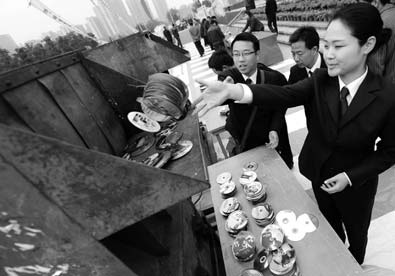Software piracy rate declining
About 45 percent of the software installed on computers in China last year was pirated, down by 2 percentage points from the previous year. Operating systems saw the lowest piracy rate of 27 percent, according to Chinalabs.com, a consulting and research company.
|
|
|
A file photo shows law enforcement offi cials putting pirated discs into a crusher to destroy them in Anhui province. China's software piracy rate has been continuously declining over the past four years, offi cial sources said. [Xinhua] |
The company, entrusted by the State Intellectual Property Office, on Monday released its latest annual report on China's software piracy, a continuation of its current five-year project.
The research, which was conducted through sample surveys, collected 2,803 samples of individual users and 1,834 samples of business users through computer-assisted telephone interviews.
"China's software piracy rate has been continuously declining for four years. It is approaching that of the developed countries," Ye Xiumin, a senior consultant with the company who worked on the project, said at Monday's press conference.
According to Ye, the rates have been dropping over the past four years: 66 percent in 2005, 63 percent in 2006, 56 percent in 2007 and 47 percent in 2008.
Cheaper products offered by software companies helped cut piracy, she said, citing Microsoft selling its latest operating system much cheaper in China than in other countries.
"Moreover, some domestic companies are providing free office and anti-virus software," she said.
By categories, the piracy rate of operating systems dropped the most, from 81 percent in 2005 to 27 percent in 2009.
Ye said stricter governmental regulations also contributed to the improvement.
"Back in 2006, several government bodies ordered the installation of genuine operating systems in all made-in-China computers. It's now guaranteed that all software used in government computers are genuine versions. Corporations are also on their way to clearing out pirated software," she said.
Office software is the high-risk group, with a piracy rate of 63 percent in 2009. The number was 84 percent in 2005.
The piracy rate of information systems dropped from 70 percent in 2005 to 48 percent last year. Standalone computer games also decreased from 68 percent in 2005 to 28 percent in 2009.
Ni Guangnan, a researcher with the Chinese Academy of Engineering, said a 45 percent piracy rate is "still high".
"As for the reason, the number is calculated in terms of the quantities of computer software installed in 2009 that required payment, where individual users are the major consumer group. Piracy is most often seen in this very group," Ni said.
Li Shunde, a professor with the Graduate University of the Chinese Academy of Sciences, said the country is working on the modification of laws and regulations to create harsher punishments for users of pirated software.
However, the statistics did not correspond with those from the Business Software Alliance (BSA), a trade organization established in 1988 to be "the voice of the world's software industry and its hardware partners on a wide range of business and policy affairs".
BSA said China's software piracy rate was 80 percent in 2008, 82 percent in 2007 and 2006 and 86 percent in 2005.
But Chinalabs.com questioned BSA's research methods.
"Their report did not provide the details on raw data and the collecting methods. Plus, based on their descriptions, the data only applies to software used on PCs, but not the general 'software piracy rates," the report said.
Even still, data from both groups showed the country's piracy rate has been declining over recent years.
 0
0 







